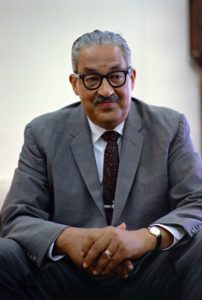Remembering Justice Thurgood Marshall
This article was originally published in the San Francisco Chronicle on October 2, 2017.
In these dispiriting times, Americans could use some heroes and, 50 years ago Monday, one truly worth revering was sworn in as the first African American to serve on the Supreme Court. Thurgood Marshall, whom I served as a law clerk, was born in 1908, in a world of rampant racism. Challenging this injustice was his life’s work.
As the head of what is now the NAACP Legal Defense Fund, Marshall spent a quarter century crisscrossing the country trying cases and establishing a network of civil rights lawyers. His cases took him to segregated communities where no hotels or restaurants would serve blacks, where lynch mobs often operated with impunity, and where white judges and law enforcement officials were part of the problem, not the solution.
Marshall’s extraordinary courage and determination helped change the landscape of American race relations. He argued cases challenging discrimination in schools, housing, voting, public transportation and police conduct. This less well known part of his life is the basis for the upcoming movie, “Marshall,” which shows not only his drive for justice, but also his exceptional personal qualities of compassion and humor.
The man who crisscrossed the country for justice went on to serve on the highest court in the land, writing landmark decisions on issues of civil rights, civil liberties, criminal justice, and the death penalty. At his memorial service in 1993, then Chief Justice William Rehnquist noted that “Inscribed above the front entrance to the Supreme Court building are the words ‘Equal Justice Under Law.’ Surely no one individual did more to make these words a reality than Thurgood Marshall.”
Marshall was the only justice who had not come from a privileged background, and he took every opportunity to remind the court and the country of persistent and pervasive racial injustices. During the year I clerked for him in the late 1970s, Marshall refused to participate in a reenactment of the drafting of the Constitution unless it was historically accurate. It would have to portray him in livery and knee britches, holding a tray. As a result, the reenactment never happened, but Marshall used other bicentennial events to remind the nation of progress yet to be made.
In a celebrated address, he pointed out that, when the founders spoke of “we the people,” they did not “have in mind the majority of America’s citizens.” Under the Constitution as originally drafted, only white landowners had the right to vote. Racial minorities and women of all colors were originally excluded from the Constitution’s protections, uninvited in its formulation, denied a voice in its ratification, and until the late 20th century, largely absent from the courts responsible for its interpretation.

“We the people,” he noted, “no longer enslave, but the credit does not belong to the Framers. It belongs to those who refused to acquiesce in outdated notions of ‘liberty,’ ‘justice,’ and ‘equality,’ and who strived to better them.”
Every American, Marshall believed, had an opportunity and obligation to continue that struggle. In 1992, in accepting the Liberty Medal, he noted, “The battle has not been won; we have barely begun. America can do better. … America has no choice but to do better to assure justice for all Americans, Afro and white, rich and poor, educated and illiterate. Our futures are bound together.” Marshall would want us to remember that message.
He would also want us to remember a story he told during my clerkship about his initial appointment to the bench. He was one of the first African Americans to sit on a federal appellate court, and shortly after his term began, he and his colleagues were scheduled for a group photograph to mark his new membership. Marshall arrived a bit late, just after the photographer had blown a fuse and everyone was milling around in semi-darkness. As he entered the chambers, the chief judge’s secretary, who had not yet met him, announced with evident relief, “Thank God, the electrician’s arrived.” To which Marshall reportedly responded, “Ma’am, you’d have to be crazy to think they’d let me in that union.” Today, of course, they would, and part of the reason is Marshall’s own leadership.
After his death, an obituary in the Legal Times noted that “Not all great men are good men. Marshall was both.” Marshall himself was more modest. In Marshall’s press conference announcing his retirement from the court, a reporter asked how he would like to be remembered. Marshall responded, “He did what he could with what he had.” This film reminds us of how much that was, and gives us a model of the kind of leader we so sorely need today.
There will be a movie screening and panel discussion of the new film Marshall in Cubberly Auditorium at Stanford University on October 10. Click here to learn more and register to attend.
Deborah L. Rhode is the Ernest W. McFarland Professor of Law, the director of the Center on the Legal Profession, and the director of the Program in Law and Social Entrepreneurship at Stanford University. She clerked for Supreme Court Justice Thurgood Marshall.
